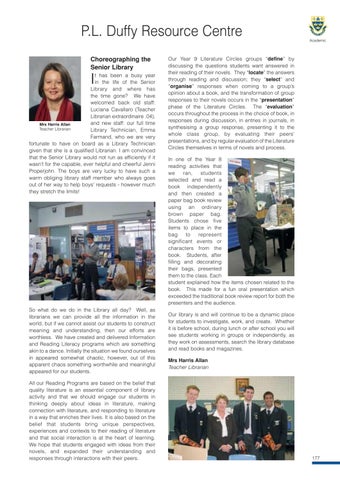P.L. Duffy Resource Centre Academic
Choreographing the Senior Library
I
t has been a busy year in the life of the Senior Library and where has the time gone? We have welcomed back old staff: Luciana Cavallaro (Teacher Librarian extraordinaire .04), and new staff: our full time Mrs Harris Allan Teacher Librarian Library Technician, Emma Farmand, who we are very fortunate to have on board as a Library Technician given that she is a qualified Librarian. I am convinced that the Senior Library would not run as efficiently if it wasn’t for the capable, ever helpful and cheerful Jenni Properjohn. The boys are very lucky to have such a warm obliging library staff member who always goes out of her way to help boys’ requests - however much they stretch the limits!
So what do we do in the Library all day? Well, as librarians we can provide all the information in the world, but if we cannot assist our students to construct meaning and understanding, then our efforts are worthless. We have created and delivered Information and Reading Literacy programs which are something akin to a dance. Initially the situation we found ourselves in appeared somewhat chaotic, however, out of this apparent chaos something worthwhile and meaningful appeared for our students. All our Reading Programs are based on the belief that quality literature is an essential component of library activity and that we should engage our students in thinking deeply about ideas in literature, making connection with literature, and responding to literature in a way that enriches their lives. It is also based on the belief that students bring unique perspectives, experiences and contexts to their reading of literature and that social interaction is at the heart of learning. We hope that students engaged with ideas from their novels, and expanded their understanding and responses through interactions with their peers.
Our Year 9 Literature Circles groups “define” by discussing the questions students want answered in their reading of their novels. They “locate” the answers through reading and discussion; they “select” and “organise” responses when coming to a group’s opinion about a book, and the transformation of group responses to their novels occurs in the “presentation” phase of the Literature Circles. The “evaluation” occurs throughout the process in the choice of book, in responses during discussion, in entries in journals, in synthesising a group response, presenting it to the whole class group, by evaluating their peers’ presentations, and by regular evaluation of the Literature Circles themselves in terms of novels and process. In one of the Year 8 reading activities that we ran, students selected and read a book independently and then created a paper bag book review using an ordinary brown paper bag. Students chose five items to place in the bag to represent significant events or characters from the book. Students, after filling and decorating their bags, presented them to the class. Each student explained how the items chosen related to the book. This made for a fun oral presentation which exceeded the traditional book review report for both the presenters and the audience. Our library is and will continue to be a dynamic place for students to investigate, work, and create. Whether it is before school, during lunch or after school you will see students working in groups or independently, as they work on assessments, search the library database and read books and magazines. Mrs Harris Allan Teacher Librarian
177




























































